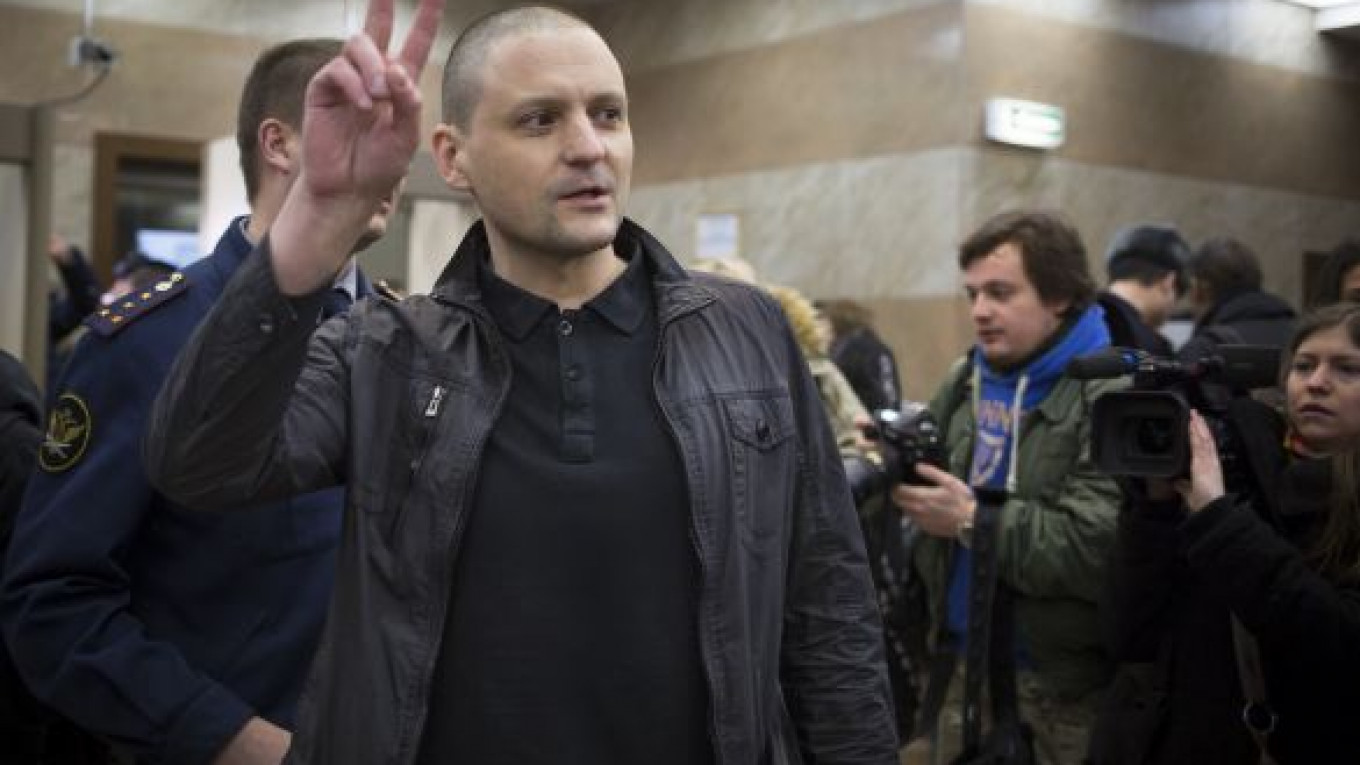Both defendants pleaded not guilty to the charges, with Udaltsov calling the indictment "a political order aimed at neutralizing active representatives of political opposition."
The trial is related to another case involving eight suspected participants of the same alleged riots, which suspects say was in fact a sanctioned rally that got out of hand after police provoked protesters. The eight suspects in the so-called Bolotnoye case are expected to be sentenced Friday.
On Tuesday, prosecutors read out the indictment to Udaltsov and Razvozzhayev at the Moscow City Court, in the presence of two dozen reporters in an adjoining room and three dozen supporters inside the courtroom. Well-known figures like veteran human rights defender Lev Ponomaryov and opposition politician Gennady Gudkov were in attendance.
Udaltsov and Razvozzhayev are accused of staging riots at Bolotnaya Ploshchad and preparing to repeatedly stage other riots in Moscow throughout 2012, intentionally financed by Georgian opposition politician Givi Targamadze. Razvozzhayev also faces charges of illegally fleeing the country with a borrowed passport.
They each face up to 10 years in prison if convicted.
Both pleaded not guilty to the charges Tuesday. Lebedev told the court that the defense "could disprove" the indictment "with the help of relevant documents," and Udaltsov said the riots were "provoked by Russian authorities."
"The given events remind me of the events in Germany in 1933, the so-called arson of the Reichstag, which led to the mass reprisals of dissidents," Udaltsov said. He was referring to the arson of the German parliament by a communist, an event which resulted in multiple arrests of opposition activists by Nazi authorities.
Alexander Zamashnnyuk, chairman of the panel of three judges presiding over the trial, seemed to set the tone for the proceedings at the very beginning of the hearing. He fended off most of the defense's pleas and remarks, constantly interrupting the defendants and their lawyers and nearly yelling at them.
Zamashnyuk rejected two out of three of Razvozzhayev's pleas. One concerned Razvozzhayev's hospitalization at the Serbsky Psychiatry Institute for medical examination because of a nervous breakdown and panic attacks. The other involved his request to be transferred to a detention center located closer to the court so that he could get more sleep and properly prepare for his defense.
Despite turning down those two requests, Zamashnyuk permitted Razvozzhayev to get a public defender in addition to his current lawyer, after Razvozzhayev cited the large amount of case materials and the need for frequent visits in pretrial detention.
Zamashnyuk also rejected Udaltsov's plea to postpone the trial in order to give two of his four lawyers — whom he had just hired — more time to study the 92 volumes of the case. Udaltsov said it took him four months to read through all the documents.
Udaltsov spoke calmly at the hearing, but just as he said he wanted to clarify his claim about a "political order," Zamashnnyuk interrupted him. The two then engaged in a half hour of bickering on whether the defendants had a right to comment on the essence of the indictment at that stage of the trial. The dispute ended with Zamashnyuk letting Udaltsov have his way and finish speaking.
In the middle of the dispute, several spectators stood up and clapped their hands in an apparent protest of the judge's remarks. They chanted "Happy Birthday!" to Udaltsov, who had celebrated his 37th birthday on Friday.
Zamashnyuk cried in vain for silence several times during the hearing and then asked bailiffs to lead all spectators out of the room, only to allow them to return 15 minutes later and warn them that another outburst would result in their withdrawal from the trial or fines.
The trial was set to resume at 11 a.m. on Wednesday.
A Message from The Moscow Times:
Dear readers,
We are facing unprecedented challenges. Russia's Prosecutor General's Office has designated The Moscow Times as an "undesirable" organization, criminalizing our work and putting our staff at risk of prosecution. This follows our earlier unjust labeling as a "foreign agent."
These actions are direct attempts to silence independent journalism in Russia. The authorities claim our work "discredits the decisions of the Russian leadership." We see things differently: we strive to provide accurate, unbiased reporting on Russia.
We, the journalists of The Moscow Times, refuse to be silenced. But to continue our work, we need your help.
Your support, no matter how small, makes a world of difference. If you can, please support us monthly starting from just $2. It's quick to set up, and every contribution makes a significant impact.
By supporting The Moscow Times, you're defending open, independent journalism in the face of repression. Thank you for standing with us.
Remind me later.






